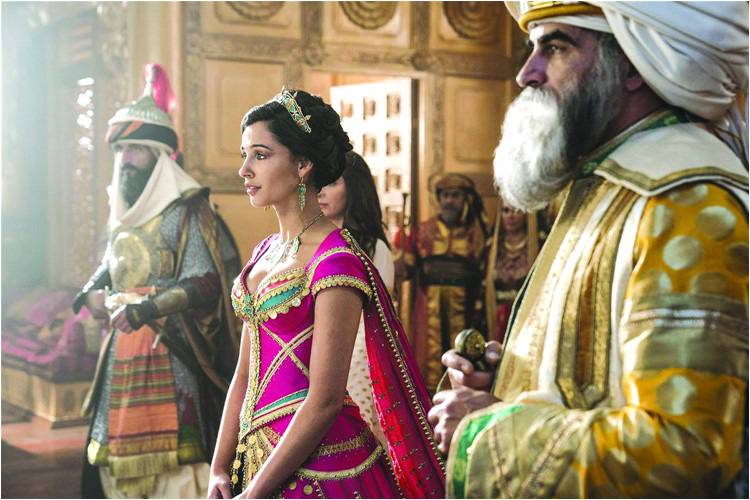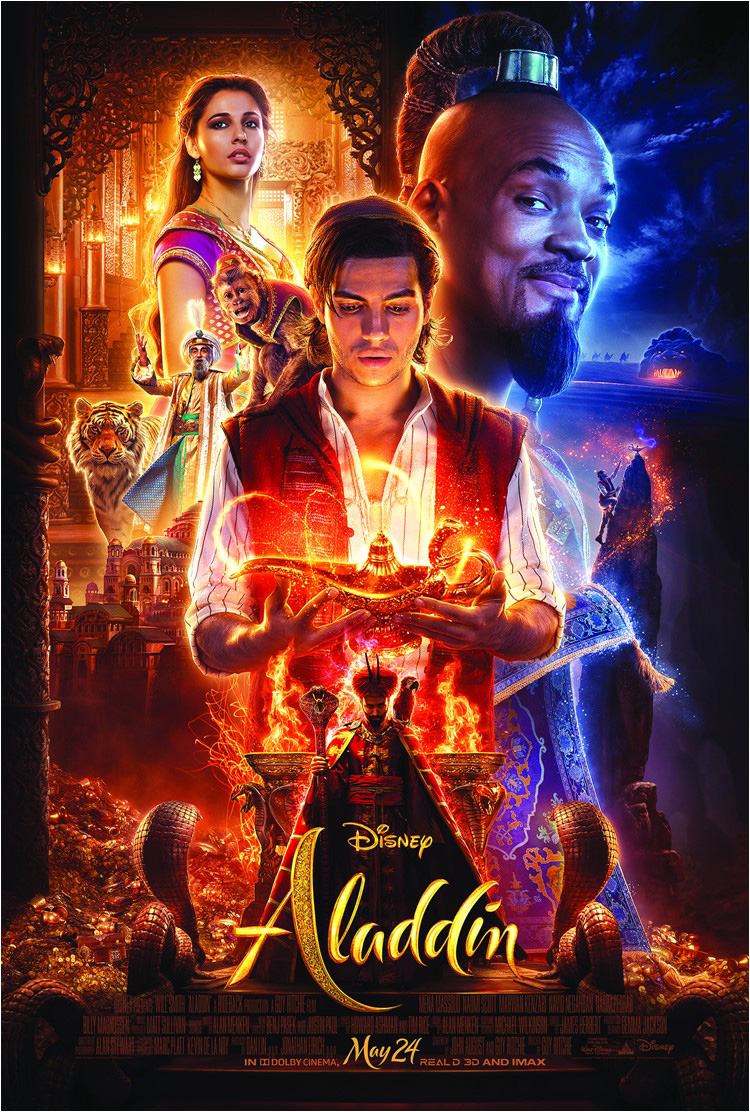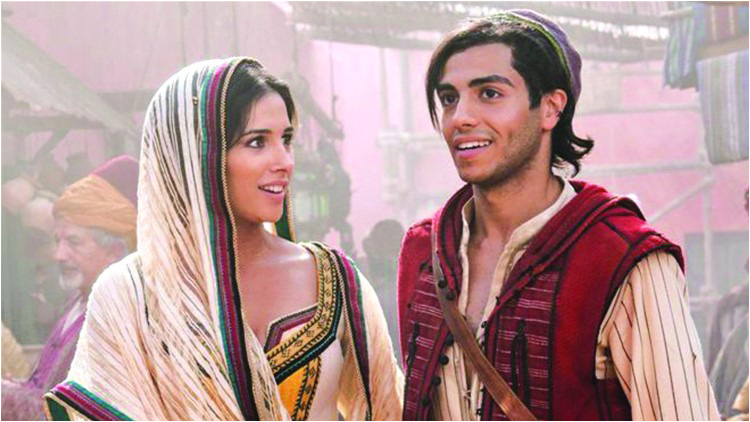
Considering how cricket fans have been clutching at straws throughout the World Cup, it’s surprising that no one came up with the comforting thought “Aladdin was also released in 1992”. Especially considering that the cricket World Cup and Aladdin are two sources of entertainment that almost every family that could afford a television in Pakistan would have watched over the past three decades.
It was on the 24th of May, 27 years after the original – if one may deem it as such – was released, that the remake was released worldwide. In Pakistan it hit the big screens a few weeks later.
The juxtaposition between the 2019 and 1992 editions was inevitable. For those politically aware, a lot was going to be gauged in accordance with the racial and ethnic stereotypes – or lack thereof.

Given the cast and screenplay, Aladdin (2019) definitely passes the Orientalist test. Whether the same can be said on the entertainment front depends on the individual – and how big a part Aladdin (1992) played in their childhood.
Hence, it is little coincidence that the current generation of kids seems to be warming up to the film more so than their parents. For the previous generation, eyebrows were raised the moment the project was announced.
While the racial makeup of the cast was the initial burning question, many were also concerned when Disney announced Guy Ritchie as the director. Not many would have an imagination that would’ve sufficed in encapsulating Ritchie remaking a fairytale.
Ritchie has managed to overcome those fears by ensuring that nothing is unnecessarily chopped or changed.
Agrabah, the imaginary town in Middle East somewhere along the Silk Route, is fittingly akin to a paintball field. For, after all, the film’s colours were always going to have a decisive impact on the cinematography.

Will Smith as Genie was always to be given a stern test, given Robin William’s immortal rendition. Smith didn’t exactly win many over when the teaser first came out, but he does manage to carve his own brand of Genie in the movie – a bodybuilder and rapper, conversant with the street parlance.
Mena Massoud as Aladdin and Naomi Scott as Jasmine do the trick as well. What is especially striking is the chemistry between the duo. Massoud might occasionally exhibit a jitter or two, especially during the comic sequences, but largely gets the job done as intended.
Aladdin might be the same old ‘street rat’ but Jasmine, fittingly, is no longer awaiting her prince charming. She is a strong, independent, politically aware princess, in complete control over her life.
Jafar (Marwan Kenzari) isn’t your cliched villain either. In fact, Jafar might be the character that has been altered the most. He’s an anti-hero, more than the stereotypical evil guy. While Kenzari does a decent job in the depiction, the rewriting of the character might leave the nostalgic among us unsatisfied – or at the least with mixed emotions.
The soundtrack is absolutely top-drawer, especially the Jasmine-led ‘Speechless’ which highlights her character and ideas. The all-time classics ‘Arabian Nights’, ‘Prince Ali’, ‘A Whole New World’ are all there, giving you all possible throwbacks to the 90s.
Staying true to the original, Aladdin’s storyline remains the tale of two people from two different worlds finding one another to complete their own worlds. It’s about friendship and freedom – the latter depicted in the characterization of Jasmine and Genie – about living out a fantasy and sharing it en route to fulfillment.
Yes, there are twists, tweaks, revamps and omissions, but it’s a 2019 rendition of the 1992 story, which depicts how the world has evolved in the past 27 years, through a retake of the events in Agrabah.
Yes, it has its heart in the right place, but whether or not this flying carpet ride through time has the same magic is for you to decide.
It was on the 24th of May, 27 years after the original – if one may deem it as such – was released, that the remake was released worldwide. In Pakistan it hit the big screens a few weeks later.
The juxtaposition between the 2019 and 1992 editions was inevitable. For those politically aware, a lot was going to be gauged in accordance with the racial and ethnic stereotypes – or lack thereof.

Given the cast and screenplay, Aladdin (2019) definitely passes the Orientalist test. Whether the same can be said on the entertainment front depends on the individual – and how big a part Aladdin (1992) played in their childhood.
Hence, it is little coincidence that the current generation of kids seems to be warming up to the film more so than their parents. For the previous generation, eyebrows were raised the moment the project was announced.
While the racial makeup of the cast was the initial burning question, many were also concerned when Disney announced Guy Ritchie as the director. Not many would have an imagination that would’ve sufficed in encapsulating Ritchie remaking a fairytale.
Ritchie has managed to overcome those fears by ensuring that nothing is unnecessarily chopped or changed.
Agrabah, the imaginary town in Middle East somewhere along the Silk Route, is fittingly akin to a paintball field. For, after all, the film’s colours were always going to have a decisive impact on the cinematography.

Will Smith as Genie was always to be given a stern test, given Robin William’s immortal rendition. Smith didn’t exactly win many over when the teaser first came out, but he does manage to carve his own brand of Genie in the movie – a bodybuilder and rapper, conversant with the street parlance.
Mena Massoud as Aladdin and Naomi Scott as Jasmine do the trick as well. What is especially striking is the chemistry between the duo. Massoud might occasionally exhibit a jitter or two, especially during the comic sequences, but largely gets the job done as intended.
Aladdin might be the same old ‘street rat’ but Jasmine, fittingly, is no longer awaiting her prince charming. She is a strong, independent, politically aware princess, in complete control over her life.
Jafar (Marwan Kenzari) isn’t your cliched villain either. In fact, Jafar might be the character that has been altered the most. He’s an anti-hero, more than the stereotypical evil guy. While Kenzari does a decent job in the depiction, the rewriting of the character might leave the nostalgic among us unsatisfied – or at the least with mixed emotions.
The soundtrack is absolutely top-drawer, especially the Jasmine-led ‘Speechless’ which highlights her character and ideas. The all-time classics ‘Arabian Nights’, ‘Prince Ali’, ‘A Whole New World’ are all there, giving you all possible throwbacks to the 90s.
Staying true to the original, Aladdin’s storyline remains the tale of two people from two different worlds finding one another to complete their own worlds. It’s about friendship and freedom – the latter depicted in the characterization of Jasmine and Genie – about living out a fantasy and sharing it en route to fulfillment.
Yes, there are twists, tweaks, revamps and omissions, but it’s a 2019 rendition of the 1992 story, which depicts how the world has evolved in the past 27 years, through a retake of the events in Agrabah.
Yes, it has its heart in the right place, but whether or not this flying carpet ride through time has the same magic is for you to decide.

